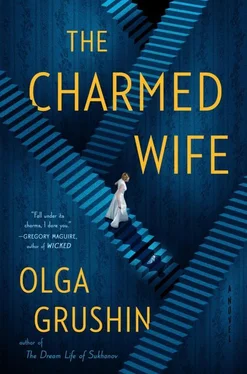“No, my love, you misunderstood. Have an orange. Wait, let me peel it for you.”
And she took the orange, and tried to think, but her temples throbbed, and she did grow uncertain, for the butler had indeed mumbled and she had been distracted, and in any case, fairy-tale princes never lied. The orange was sweet. Prince Roland was sweet. Their life was surely sweet. And look, there were cavorting pink-cheeked cupids painted on her ceiling and tiny blue flowers embroidered on her snowy eiderdown, and the sun slanted joyfully through her lacy blue curtains, and things were now firmly back in their places, just where they had always been. Her love for the prince was all abating bewilderment and deepening relief. While she ate the orange, he played with her golden ringlets, and the tips of his fingers smelled of sweet juice.
By the time he left, she was smiling again, if a bit wanly.
• • •
“‘Overtaken by some passing sickness’!” the witch snorts. “Doesn’t matter what they actually tell you or how plausible it is, it only matters whether you are willing to believe it. And you are, and you are, and you are, until one day—snap!—you aren’t. And here we are, up to our elbows in toad skins and newt eyeballs.”
“Ah, don’t listen to her, my darling,” croons the fairy godmother. “You were simply overexcited by that green-eyed lady’s admittedly vulgar approach to interior decorating, and you forgot proper etiquette. Surely, a visiting princess must quietly await her hostess instead of barging through rooms without knocking on doors? Of course, such an embarrassing display of poor manners would cause some coolness between you and your husband, but that’s far from tragic.” She gives me one of her patient smiles. “And just between us, my heart, it pays to close your eyes to minor missteps. A man is not a supermarket, you know, you can’t just stroll down the aisles with a basket on your arm, picking and choosing whatever you please. Still, a spoonful of tar shouldn’t ruin a barrel of honey. I see no reason to resort to murder.”
I make no reply. The woman’s middle-aged certainties are all of a kind, belonging to a world of nighttime cups of warm milk, herbal remedies for both toothaches and heartaches, sensible commonplaces, and reduced passions, and I am already too old and still too young to believe in such placid wisdom.
“Not altogether romantic of you, now, is it,” the witch says mildly as she stirs the brew, “suggesting that poor put-upon wives ignore their spouses’ transgressions with such vigor, all in the name of pragmatism and material comfort?”
“In the name of peace and love,” the fairy godmother says firmly.
“Is it, though? Is it, really?” The witch shrugs. “Well, you are the resident expert on love around here, I just clean up the mess afterward. Still, from where I stand, it seems much more pleasant to be eating éclairs amidst silk cushions in some lovely little palace than to be getting soaked at a crossroads. It pays to be oblivious, wouldn’t you agree, for as long as you can take it—or should I say, fake it?”
“I don’t see what you’re implying here,” the fairy godmother blusters.
I do, though, and my breath hitches with a sudden sense of unease.
“Please.” My voice breaks a little. “Please. Can we just get on with this?”
The surface of the potion has continued to flicker all the while.
When we look down, it is already spring in another year.
In her twenty-ninth year, she began to have unsettling dreams, of herself drifting lost—and, shockingly, naked—through dark, scented places where no walls ran straight, no angles were right, but everything curved and wavered and candles quivered and peaches dripped and cats streaked softly past her bare calves. When she awoke, her rib cage heaved as if something untamed were beating against it from the inside, and there was a hot heaviness somewhere at her core, at the bottom of her stomach, perhaps, that she did not understand and did not like. On such mornings, she threw on her dress, ran to the nursery, and, relieving Nanny Nanny (who was shedding just then and welcomed rest), drew princesses and built cardboard castles with Angie, then, after putting her down for a nap, sat by her bed and told her about the ball, about the slipper, hurrying just ahead of the child’s questions in her scramble to reach the happy ending, again and again.
“And they danced together all night,” she would say in a rush, “until the clock began to strike midnight. Then she fled as fast as she could, and in her haste lost one glass slipper on the stairs. And the prince declared that he would marry the girl whom it fit. And all the girls in the kingdom tried it on, but it fit no one, until the courier came with it to our house. My ugly stepsisters did their best to squeeze their big, ugly feet into it, but they failed. And then the courier got down on one knee and put the slipper on my foot, and of course it fit perfectly. They took me to the palace, and dressed me in beautiful clothes, and held the royal wedding, and then the prince and I lived happily ever after, while the stepsisters got just what they deserved. Gloria, the older one, never married at all and became a bitter spinster, while Melissa married someone so poor she now spends all her time scrubbing floors and washing dishes!”
But as she told the story over and over, it grew leached of inner meaning, as a word might when one repeated it too often, and she started to find it oddly lacking. What if the slipper had fit someone else—would the prince have married the other girl instead, would he have even known the difference? Was she, in fact, all that different from every other maiden with a sweet singing voice and a patient disposition? What exactly had he liked about her at the ball—the way she waltzed, the cut of her bodice, the childlike size of her feet? Why hadn’t they asked each other’s names, or, failing that, favorite colors at least, or favorite ice cream flavors? Also, and most disconcertingly, why did the recollection of the young courier kneeling before her—the brief pressure of his hand upon her bare instep as he had helped guide it inside the slipper, the golden brown of his gaze that had lingered one moment too long on her lips, the soft burr of his accent (like her, he had come from a distant land as a child)—why did it make her feel so profoundly unsettled?
It was at this point in her ruminations that she rose and, blushing, went to see her husband. They had not been alone in quite some time. The guard at Prince Roland’s door muttered apologies while trying to bar her way into the study, but she distracted him with her most radiant smile, ducked under his elbow, and pushed the door open. The prince sat behind his massive oak desk, his elegant fingers steepled, his eyes closed, a thoughtful look on his face, while one of the Singing Maids—they only ever employed singing maids in the palace—appeared to be crawling in search of something underneath the desk, her ample uniformed rump protruding beyond the desk’s carved phoenixes and vines, undulating in some hurried rhythm.
At the slamming of the door, Prince Roland’s eyes flew open, his eyebrows flew up, and he said, his usually smooth voice rather husky: “Esmeralda, you may stop looking for that thumbtack now, my wife is here.”
She heard a choked exclamation, a rustling of clothes, and presently Esmeralda emerged from under the desk, a bit rumpled and red-cheeked, her mouth slack, her small black eyes running about her face like startled beetles. She gave the maid a polite nod, then, once the door closed behind the woman, went and sat in Prince Roland’s lap, entwining her arms about his neck.
Читать дальше












